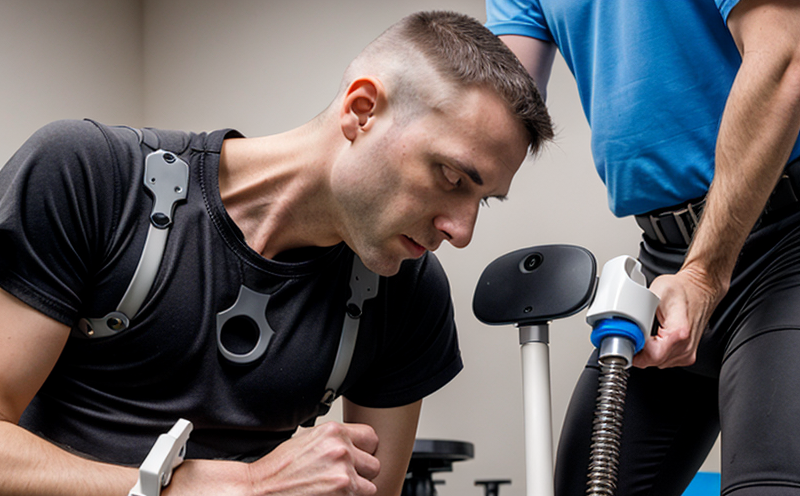ASTM F2346 Prosthetic Bearing Wear Testing
The ASTM F2346-18 Standard Test Method for Determination of Wear and Fracture in Orthopedic Prosthetic Bearings is a critical standard that ensures the reliability, safety, and performance of orthopedic prosthetic bearings used in hip or knee replacements. This test method provides a standardized approach to evaluate wear and fracture properties under simulated conditions that closely mimic real-world use.
The testing process involves subjecting the prosthetic bearing to cyclic loading similar to what it experiences during daily activities like walking, climbing stairs, or sitting down. The test apparatus simulates these activities using a specialized machine designed to replicate the mechanical stresses acting on the bearing. During this process, various parameters such as load, speed, and lubrication conditions are carefully controlled.
The ASTM F2346 method focuses particularly on the wear of the prosthetic bearing surfaces. Wear is quantified by measuring the mass loss or volume change of the tested specimen over time. Additionally, any signs of fracture within the bearing material are meticulously documented. These measurements help determine whether the bearing meets the necessary performance criteria outlined in this standard.
For compliance with regulatory requirements and quality assurance purposes, laboratories must adhere strictly to ASTM F2346-18 when performing these tests. Compliance officers can rely on our laboratory's expertise to ensure accurate and reliable results that meet all specified standards.
The importance of ASTM F2346 cannot be overstated for several reasons:
- It provides a clear pathway towards ensuring patient safety by preventing potential failures due to excessive wear or fracture.
- It supports the development and improvement of new materials and designs aimed at enhancing longevity and effectiveness of orthopedic prostheses.
- Compliance with this standard is essential for meeting FDA, ISO, and other international regulatory guidelines.
In summary, ASTM F2346-18 plays a pivotal role in the medical device industry by providing a robust framework to assess the wear resistance of orthopedic prosthetic bearings. By adhering to this standard, manufacturers can ensure their products are safe and effective for use in clinical settings.
| Industry Applications |
|---|
|
Industry Applications
The ASTM F2346-18 standard is widely utilized across the orthopedic medical device industry. Here are some key applications:
- Material Development: Manufacturers can use this test to evaluate different materials and their wear resistance properties.
- Clinical Trial Preparation: Before launching a new prosthetic bearing into clinical trials, the manufacturer must ensure it meets all required standards through rigorous testing.
- Post-Market Surveillance: After market release, ongoing monitoring of prosthetic bearings can be conducted to identify any potential issues early on.
The results from ASTM F2346-18 are particularly valuable for companies engaged in developing advanced materials or novel designs intended to enhance patient outcomes. By leveraging this standard, they can demonstrate adherence to industry best practices and regulatory expectations.
Moreover, the insights gained through these tests contribute significantly towards improving overall product quality and reliability. This translates directly into enhanced patient satisfaction and better health outcomes following surgery involving prosthetic implants.
Why Choose This Test?
Selecting ASTM F2346-18 for your testing needs offers numerous advantages:
- Regulatory Compliance: Ensures strict adherence to FDA, ISO, and other relevant international standards.
- Quality Assurance: Provides consistent and reproducible results which are essential for maintaining high-quality product performance.
- Innovation Support: Facilitates the development of improved materials and designs by providing detailed data on wear resistance.
The test is especially beneficial because it simulates real-world conditions accurately, giving manufacturers a realistic idea of how their products will perform post-deployment. This comprehensive approach helps identify potential weaknesses early in the design phase, allowing for necessary modifications before full-scale production begins.
Additionally, using this standard ensures that all parties involved—whether they are researchers, clinicians, or regulatory bodies—are working towards common objectives based on universally accepted criteria. This uniformity fosters trust and confidence among stakeholders, making ASTM F2346-18 an indispensable tool in the medical device sector.
Customer Impact and Satisfaction
The impact of ASTM F2346-18 on customers cannot be understated. For patients undergoing orthopedic surgeries, the reliability and longevity of their prosthetic devices are crucial factors in recovery and long-term health.
By choosing a laboratory that adheres to ASTM F2346-18 standards, customers benefit from:
- Better Performance: Products tested according to this standard demonstrate superior wear resistance, reducing the risk of early failures.
- Increased Confidence: Knowing that their devices meet stringent international standards instills confidence in both patients and healthcare providers alike.
- Better Value: Long-lasting products mean fewer replacements, ultimately saving costs for both consumers and insurance companies.
R&D teams also reap significant benefits from this testing protocol. They gain valuable feedback on their innovations which helps refine future iterations of prosthetic bearings further enhancing patient care.
In summary, adopting ASTM F2346-18 ensures that every aspect of the orthopedic prosthetic bearing undergoes rigorous evaluation ensuring top-notch quality and reliability thus contributing to overall customer satisfaction within the medical device industry.





